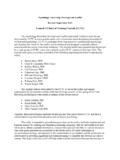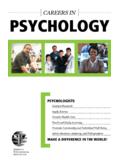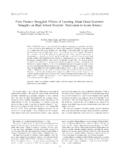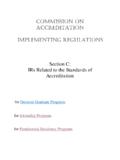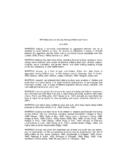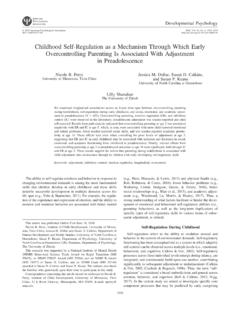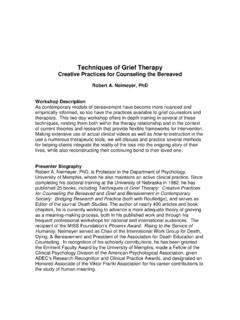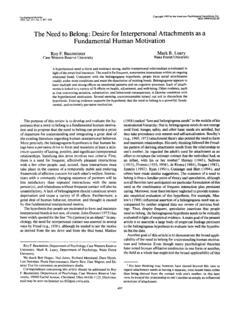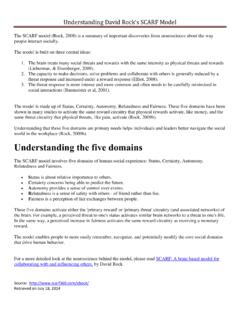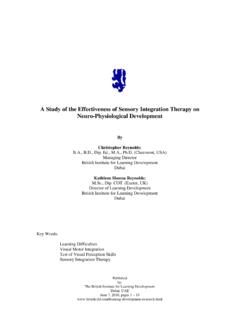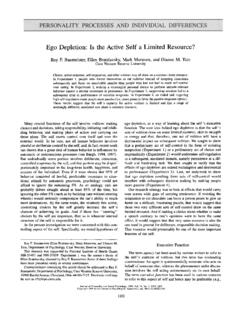Transcription of Journal of Personality and Social Psychology
1 Journal of Personality and SocialPsychologyThe Link Between Self-Esteem and Social Relationships:A Meta-Analysis of Longitudinal StudiesMichelle A. Harris and Ulrich OrthOnline First Publication, September 26, 2019. , M. A., & Orth, U. (2019, September 26). The Link Between Self-Esteem and SocialRelationships: A Meta-Analysis of Longitudinal Studies. Journal of Personality and SocialPsychology. Advance online publication. Link Between Self-Esteem and Social Relationships:A Meta-Analysis of Longitudinal StudiesMichelle A. HarrisThe University of Texas at AustinUlrich OrthUniversity of BernTheorists have long assumed that people s self-esteem and Social relationships influence each , the empirical evidence has been inconsistent, creating substantial uncertainty about whetherrelationships are in fact an influential factor in self-esteem development and vice versa. This meta-analysis synthesizes the available longitudinal data on the prospective effect of Social relationships onself-esteem (48 samples including 46,231 participants) and the prospective effect of self-esteem on socialrelationships (35 samples including 21,995 participants).
2 All effects controlled for prior levels of theoutcomes. Results showed that relationships and self-esteem reciprocally predict each other over timewith similar effect sizes ( .08 in both directions). Moderator analyses suggested that the effects heldacross sample characteristics such as mean age, gender, ethnicity, and time lag between assessments,except for the self-esteem effect on relationships, which was moderated by type of relationship partner(stronger for general relationships than for specific partners) and relationship reporter (stronger forself-reported than for informant-reported relationship characteristics). The findings support assumptionsof classic and contemporary theories on the influence of Social relationships on self-esteem and on theconsequences of self-esteem for the relationship domain. In sum, the findings suggest that the linkbetween people s Social relationships and their level of self-esteem is truly reciprocal in all develop-mental stages across the life span, reflecting a positive feedback loop between the :longitudinal studies, meta-analysis, prospective effects, self-esteem, Social relationshipsA longstanding assumption in Psychology is that Social relation-ships play a key role in shaping individuals self-esteem ( ,Leary, 2012), or the subjective evaluation of their overall worthi-ness as a person ( , see Robins, Tracy, & Trzesniewski, 2008;Rosenberg, 1965).
3 Although there is abundant empirical supportfor the concurrent association between various relationship char-acteristics and self-esteem ( , Cameron & Granger, 2019;McArdle, Waters, Briscoe, & Hall, 2007; Murberg, 2010; Neff &Geers, 2013; Poulsen, Ziviani, & Cuskelly, 2006; Rosario, Schrim-shaw, & Hunter, 2011; Schuengel et al., 2006), longitudinal re-search has produced mixed findings, with some studies findingevidence for longitudinal effects of Social acceptance on self-esteem ( , Wagner, L dtke, Robitzsch, G llner, & Trautwein,2018) but other studies finding no support for the effect of closerelationships on self-esteem development ( , Harris et al., 2015).Adding to the complexity of this empirical association, whenindividuals are asked to explain the sources of their self-esteem, Social relationships are mentioned infrequently, compared withother sources ( , achievements, Personality traits; Harris, Don-nellan, Beer, & Trzesniewski, 2019).
4 As it stands, the inconsis-tency of the current state of knowledge creates substantial uncer-tainty about whether Social relationships in fact are an influentialfactor in self-esteem related question is whether self-esteem has an influence oncharacteristics of Social relationships ( , see Murray, Holmes, &Collins, 2006; Srivastava & Beer, 2005; Swann & Read, 1981).According to dynamic interactionism (Asendorpf & Wilpers,1998; Magnusson, 1990), there are likely to be reciprocal effectsbetween individuals self-esteem and quality of Social relation-ships. Previous research has found a small meta-analytic effect ofself-esteem on Social relationships, based on longitudinal studiesexamining self-esteem at one time point and Social relationships ata later time point (Cameron & Granger, 2019). However, theeffects included in the Cameron and Granger (2019) meta-analysiswere not controlled for prior assessments of Social relationships,and thus they do not provide much stronger insights than cross-sectional correlations, as the observed effects could simply beEditor s C.
5 McLean served as the handling editor for thisarticle. MLCXM ichelle A. Harris, Department of Psychology , The University ofTexas at Austin; Ulrich Orth, Department of Psychology , University material is based upon work supported by the National ScienceFoundation Graduate Research Fellowship under Grant 1650042. Anyopinion, findings, and conclusions or recommendations expressed in thismaterial are those of the author(s) and do not necessarily reflect the viewsof the National Science Foundation. Data and code are available at concerning this article should be addressed to MichelleA. Harris, Department of Psychology , The University of Texas at Austin,108 Dean Keeton Street, Stop A8000, Austin, TX 78712. document is copyrighted by the American Psychological Association or one of its allied article is intended solely for the personal use of the individual user and is not to be disseminated of Personality and Social Psychology : Personality Processes and Individual Differences 2019 American Psychological Association2019, Vol.
6 1, No. 999, 000 ISSN: 0022-3514 forward by the stability of the outcomes (Cole & Maxwell,2003). Furthermore, longitudinal research that has controlled forprior assessments of Social relationships has produced mixed find-ings regarding the effect of self-esteem on later Social relationships( , see Brummelman et al., 2015 for support and Klima &Repetti, 2008 for no support). Thus, it is unclear based on thecurrent state of research whether individuals self-esteem influ-ences characteristics of their Social relationships over the present research, we meta-analytically synthesized theevidence from longitudinal studies to estimate the reciprocal ef-fects between Social relationships and self-esteem and tested formoderators of each effect. It should be noted that the two direc-tions of effects are not mutually exclusive and that both processescould operate simultaneously. In addition, we include a broadrange of relationship characteristics to maximize statistical powerand to test the broad research question of whether there are robust,prospective associations between Social relationships and self-esteem.
7 Finally, because the significance of specific relationshippartners may vary across age ( , beginning with great importanceon relationships with parents in childhood, transitioning to theneed for peer approval in adolescence, and seeking high regardfrom romantic partners in adulthood; , Bornstein, Jager, &Steinberg, 2012), we organize our review of existing empiricalresearch below based on ages across the life of Social Relationships on Self-EsteemTheoretical PerspectivesSeveral theorists have posited that significant relationships in-fluence self-esteem ( , Bowlby, 1973; Cooley, 1902; Leary & baumeister , 2000; Mead, 1934). For example,sociometer theorystates that the sole purpose of self-esteem is to function as a systemfor monitoring others reactions to the self (Leary, 2000, 2004,2006, 2012; Leary & baumeister , 2000), which suggests thatself-esteem fluctuates along with the level of approval from second major framework,reflected appraisals theory, empha-sizes the role of perceived appraisals from others for shaping theway individuals come to view themselves (see Cooley, 1902;Harter, 1999; Mead, 1934; Shrauger & Schoeneman, 1979).
8 Thistheory suggests that the self isexclusivelyexperienced indirectly,through the eyes of significant others as well as generalized society( , Yeung & Martin, 2003).Attachment theory(see Ainsworth,1973; Bowlby, 1973, 1980, 1982, 1988; Sroufe, 2002; Thompson,2006) is a third established perspective that has at the core of itstenets the idea that relationship bonds are directly related toself-esteem. That is, the relationship security with the primarycaregiver in infancy is thought to be internalized and impact laterrelationship experiences with peers and romantic partners (Feeney,Cassidy, & Ramos-Marcuse, 2008; Hazan & Shaver, 1994). Thus,bonds with all close others presumably signal to the self a gener-alized notion of one s worth as a person that you are eithervalued for who you are from these stable, important people in yourlife, or you are not considered important from these people and aretherefore an unworthy person.
9 The common thread across themajor theoretical frameworks presented here is that Social relation-ships matter for self-esteem over time (even though nuances suchas the type of relationship or process by which they matter maydiffer across the theories).Cross-sectional research finds robust support for the concurrentassociation between self-esteem and the quality of individuals Social relationships, often at about small to medium effect size( , McArdle et al., 2007; Murberg, 2010; Neff & Geers, 2013;Poulsen et al., 2006; Schuengel et al., 2006). However, cross-sectional findings cannot inform theories proposing an effect ofrelationships on self-esteem or theories proposing an effect ofself-esteem on relationships. Longitudinal designs allow research-ers to come closer to understanding causality (though still do notcompletely speak to causal relations between variables). However,the available evidence from longitudinal studies on self-esteemand relationships is inconsistent, with some studies reporting effectsizes that are close to zero or nonsignificant and other studiesfinding substantive and significant effect sizes.
10 In the sectionbelow, we review the existing longitudinal research. Special focusis given to the age periods, statistical approaches, and relationshipcharacteristics assessed, as these factors varied considerably EvidenceRegarding childhood, recent longitudinal studies support thenotion that the degree of parental warmth and support receivedpredicts children s self-esteem not only when assessed later inchildhood but even when assessed many years later in adolescenceand young adulthood (Harris et al., 2017; Orth, 2018). However, itshould be noted that not all studies consistently confirmed thiseffect. For example, although Brummelman and colleagues (2015)found consistent support for the influence of child-reported paren-tal warmth on children s later self-esteem, there was no influenceof parent-reported parental warmth on children s self-esteem (con-trasting significant effects of parent reports found in Harris et al.)


